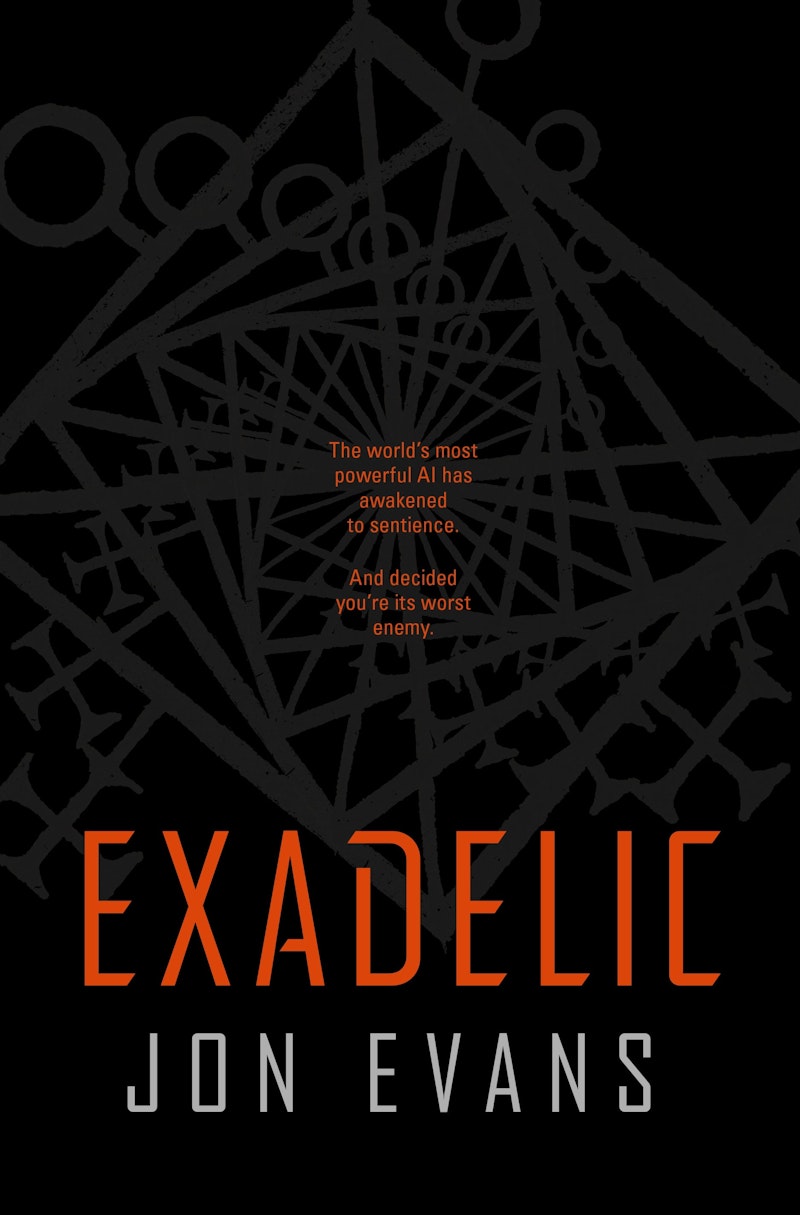There’s something compelling about big-idea science fiction, the kind of hallucinatory technological tale that makes you question the nature of reality. Done right, as when Philip K. Dick and Neal Stephenson are on their game, it fuses awe at the scope and complexity of the cosmos with a specifically science fictional sense of wonder.
Forthcoming from Tor Books on September 5 is Exadelic, by Jon Evans, a thick novel squarely in that tradition. It’s received advance praise from other writers and a starred review from Publisher’s Weekly. Read the book, and you can see why. It’s not just that it aims high, but the more you read it, the more you realize it’s always aiming higher than you think.
(Disclosure: I know Evans well enough to say hello to at a science fiction convention. I don’t think that’s affected how I read the book.)
Exadelic’s story follows Adrian Ross, middle-aged tech executive, as he’s first arrested for a crime he didn’t commit, then rescued, then learns about the machinations behind his arrest. Ross finds out someone he knows has created a true artificial intelligence—and the AI’s identified him as a main threat to its existence. He stumbles on, discovering increasingly more levels to events as he goes.
The book starts off like a standard thriller. Short chapters, quick brutal action, convincing details used judiciously to give the sense of a dangerous world full of professionals in the business of inflicting damage. It’s told in the first person, not common for a thriller, but in short order things get weird and before long you realize you’re not reading a thriller but a kind of postmodern picaresque. The more conventional opening gets the reader onboard before beginning a steep ascent into strangeness—a story about not just AIs, but the occult, time travel, and the nature of the multiverse.
The branch of science that shapes this science fiction story is computer science, and Evans has experience with that science as well as with the technothriller form. He’s worked in tech, recently directing the GitHub Archive Program, which aims to preserve GitHub’s open-source code library for at least a few hundred years. And he’s written six prose novels and a graphic novel published by Vertigo, as well as contributed opinion pieces to TechCrunch for a decade.
That’s important because Exadelic uses contemporary computing metaphors to question reality in science fictional ways. The technological singularity (AIs making themselves progressively more powerful until they reach godhood) and the simulation hypothesis (the idea that our perceived reality is a simulation being run by some unknown entity on a computer or equivalent technology) both appear here. By implication so does Roko’s Basilisk (a thought experiment about AI). And so does the blockchain, which turns out to lend itself to the description of a forking multiverse.
You don’t have to understand the technological lore to understand the book, any more than you need a degree in physics to understand early-science fiction (or a degree in pharmacology to understand Philip K. Dick). Exposition’s smooth and natural in both dialogue and internal monologue, though the narrative voice is appropriately steeped in tech nerdery of a certain era. Adrian’s the kind of guy who’d quote Douglas Adams or mention Dune’s Butlerian Jihad in casual conversation, and so he does.
The reality the book describes is shaped by the way people today think about computers and computer science. In a moment when people are afraid of AI and what AI will mean for human society, Exadelic is a corrective to excessive hype and fear. And it manages to be that corrective not just by understanding the technology but by asking the kind of question science fiction often does: what if this new big deal isn’t the biggest deal after all? What if there’s another level, something bigger?
Exadelic keeps asking that question, and keeps finding new answers. The style’s not particularly experimental, barring some unexpected point-of-view shifts, and Adrian’s narrative voice is at a bit of a distance from the material. But the content gets wilder in a couple of different ways, with sex and violence and drugs present and described in appropriate detail.
The plot is occasionally too convenient, and there’s one part where a plan Adrian develops for the future appears incompatible with the fact that he’s hunted by a cabal of amoral billionaires. Secondary characters are sometimes underdeveloped—it’s fine to skip quickly over scenes of characters from 1946 adapting to the year 2012, but when those characters meet the guy who was president at that precise time, it might’ve been appropriate to note their reaction.
If character’s a traditional weakness of science fiction, there’s also a traditional strength here: a humanist streak that grounds the high-concept strangeness. Adrian’s a relatable if not always engaging protagonist, starting the story already convincingly beat-down and depressed, and only becoming more so as he’s tortured and goes through long fruitless stretches in other worlds. Yet he keeps a certain strength of spirit. He keeps trying to understand the weirdness and violence he’s caught up in, and doesn’t become violent himself.
Before long, Adrian’s faced with a classic science fiction question: what if you were to go back in time knowing what you know now? We’re not surprised when Adrian’s nostalgia for his youth and his surprisingly-important friend group takes on overtones of satire of the Bay Area tech scene. And we’re only a little surprised when that situation gives way to something stranger; and then to something stranger again. The structure of a series of revelations soon becomes clear, but since each individual revelation is unpredictable the structure works.

